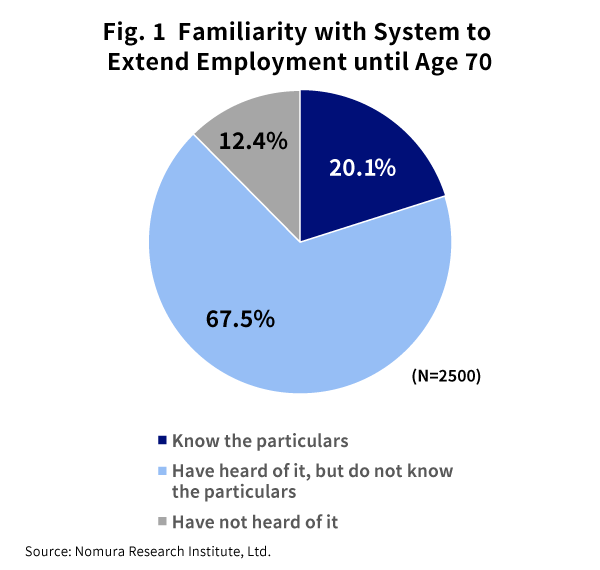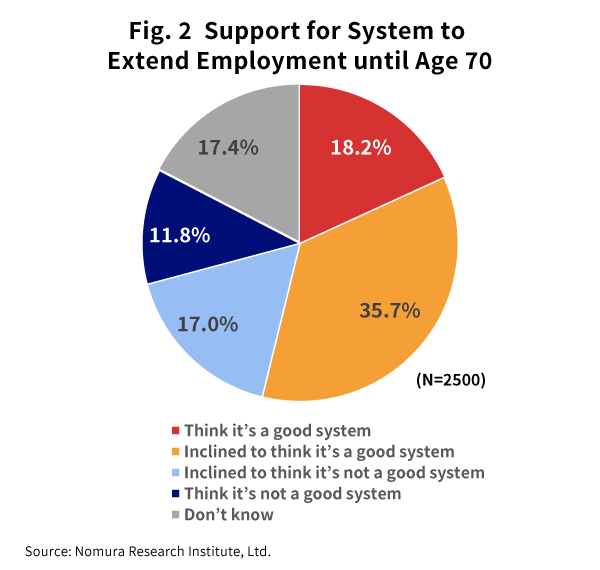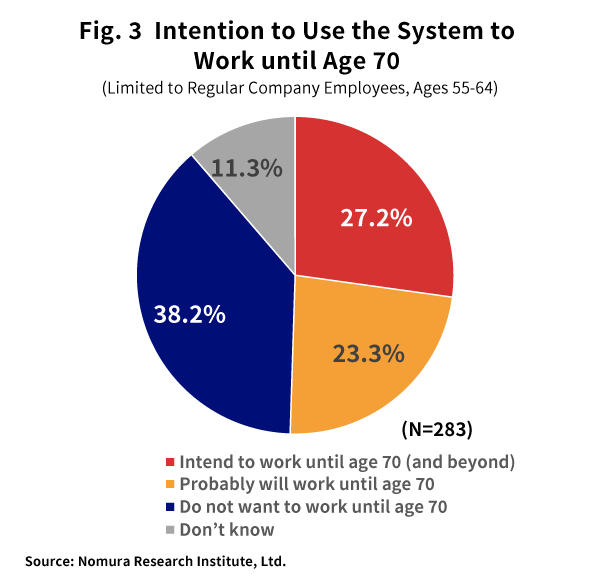
In View of the “System to Extend Employment until Age 70”, What Does the Post-Baby-Boom Generation Think About Work?
Each year, NRI Social Information System Services conducts a survey of the employment attitudes and behaviors of seniors aged 55 to 79. This year, with the revision of the “Act on Stabilization of Employment of Elderly Persons” slated to obligate corporations to make efforts to “ensure employment opportunities up to age 70” from April 2021 onwards, the survey focused on these systemic revisions (“Changes in the Employment Needs and Attitudes of the Elderly” questionnaire). We spoke with Takashi Komatsu and Nobuaki Takada of NRI Social Information Systems about the results.
How will the “System to Expand Employment until Age 70” change the way seniors work?
With the revision of the “Act on Stabilization of Employment of Elderly Persons”, starting in April 2021 Japanese companies will be subject to a new duty to make efforts to “ensure employment opportunities up to age 70”. Thus far, companies have been obligated to employ all interested employees until age 65 through continuing employment mechanisms, including contract employment and the abolition or extension of mandatory retirement ages. The current revision, however, extends this obligation to age 70. In addition, reemployment with other companies, freelance contracts, support for new ventures, and support for philanthropic activities will become possibilities, thus expanding the employment options available to seniors.
Survey results show that approximately 80% of private-sector companies consider extending employment until age 70 a “relatively realistic proposition” (Lifeworks, “Survey on the 70-Year-Old Worker Society”, June 2019). However, while there have been many surveys of this sort that focus on the company perspective, we felt there had not been enough opinion polling on how these issues are reflected in the eyes of the seniors who will be affected by these changes. Thus, in March 2020, NRI Social Information System Services conducted a survey of 2,500 people with a focus on these issues.
What trends in senior employment can we see in the results of the questionnaire?
Among the target group of respondents, aged 55 to 79, around 37% of respondents were currently working. The rate of employment among men aged 60 to 64 was approximately 70%, but this rate declined by around 40% in the 65-70 age range. In addition, among women aged 55 to 64, potential jobseekers saying they “think I would like to work in the future” accounted for 15%.
Of the respondents aged 55 to 79, around 39% of those currently employed were regular company employees. Among men, the tendency was for the percentage of regular employees to decline sharply and for the modes of employment to diversify with age; among women, the prevalence of part-time and temporary workers continued into the mid-70s.
Approximately 73% of those working as regular company employees were employed under mandatory retirement systems, but within that group, only 46% of those younger than the mandatory retirement age wanted to “use the reemployment system to work in the same workplace”, thus revealing that pre-retirement seniors are considering diverse approaches to work after retirement.
In addition, 80% of people working as regular employees after mandatory retirement had used the reemployment system etc. to continue working in the same workplace. The percentages of those respondents who stated that their working hours and job descriptions “had not changed” since mandatory retirement were high, at around 69% and 59% respectively, but approximately 72% noted that their pay “had declined”. Meanwhile, work satisfaction tended to increase with age, with women reporting higher work satisfaction than men across all age groups.
Only 20% say they know the particulars of the “System to Extend Employment until Age 70”

The level of familiarity with the Employment Extension System was not especially high, with only around 20% of respondents saying they “knew the particulars” and around 68% saying they “had heard of it” but knew little more than that. However, both men and women tended to report greater familiarity with increasing age. In the case of men, for example, only 14% of 55-to-59-year-olds reported “knowing the particulars”, but this percentage rose to around 29% among men aged 70 to 74.

In evaluating the Employment Extension System, approximately 18% of respondents said they “think it’s a good system” and approximately 36% said they are “inclined to think it’s a good system”, with both men and women evaluating the system more favorably as their ages increased. However, among men aged 55 to 64, a group likely to enjoy the benefits of the system going forward, only around 40% rated the system favorably.
In addition, a review of the responses from currently employed respondents shows that people with better health or higher satisfaction with their current work are more likely to want to use the system to keep working longer. Moreover, no correlation with available financial assets could be found, indicating that economic concerns are not the only factor motivating seniors to keep working.
Seniors supportive of the Employment Extension System want diverse ways of working
With regard to how respondents want to continue working to age 70 under the system, an eye-catching 57.8% of ages 55 to 59 and 68.3% of ages 60 to 64 said they “want to continue my current work, while also trying other work through concurrent employment”. This shows that there is strong interest in concurrent employment.
When the relationship between the intensity of this interest in concurrent employment and the percentage of respondents hoping to keep working in their current industry is broken down by profession, the trends show that in the education/learning support and medical/care fields, many respondents are interested in concurrent employment but want to remain within the same industry. By contrast, in finance, insurance, and construction, few respondents want to continue working in their current industries, and there is substantial interest in concurrent employment in other fields.
Matching employment needs with hiring needs will be important

With regard to the potential use of the system, it was clear that half of respondents aged 55 to 64 who are employed as regular company employees, and thus will fall within the scope of the Employment Extension System going forward, intend to utilize the system to work until age 70. Approximately 27% of respondents said they will “work until or beyond age 70”, and an additional 23% said they will “probably work until age 70”. Respondents aged 60 to 64 regarded this as a more real issue than people aged 55 to 59, and thus showed greater willingness to work until age 70. In addition, the actual age to which those planning to “work until or beyond age 70” wanted to continue working was 72.8 years on average, suggesting that 70 is decidedly not a cutoff point and that many people want to continue working even longer.
The approaches to work being considered by pre-retirement seniors are diverse, and encompass not only using the reemployment system to work in the same workplace, but a wide range of alternatives including independently searching for new employers. Because of this, a variety of support measures will be needed to ensure that seniors can continue working, including matching employment needs with hiring needs and smoothing the transition to employment through age 70 and beyond.
Profile
-
Takashi Komatsu
-
Nobuaki Takada
* Organization names and job titles may differ from the current version.